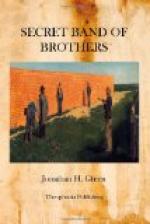Mr. F. contended, in opposition to such laws, that a man had a perfect right to do what he pleased with his own things. Any legislation to the contrary was tyranny. More mischief and immorality would result from such laws than from the vice itself—for it was a violation of one of the rights of man on the mere score of expediency. He contended, therefore, that men had a perfect right to do what they pleased with their own things, so long as they did not interfere with the rights of others. A drunkard could not drink without disturbing other people—why not make his a Penitentiary offence? Yet a gambler was considered a Penitentiary offender, though he did not interfere with the rights of others.
What were speculators in railroads, &c. &c.?—Why many of them gamblers on the largest scale!
In noticing the temptations of gambling, Mr. F. said that he and other gamblers had often warned youths against entering upon that dangerous course, and had thus saved them from ruin.
Mr. F. argued against the law recently enacted at Harrisburg against gambling, on the ground that it was partial and unjust.
One of the strangest things was, that a man who had been imprisoned, had been an outcast himself, should be the first to betray, and to place others in the same situation, and send them to the Penitentiary. Yet such was the case with the gentleman who had come from Ohio to Harrisburg to assist in obtaining the passage of the law against gambling.
Mr. Green replied, and defended the law in question, as it was passed in Pennsylvania; and read a section, in which gamblers, without a fixed residence, were, upon conviction, to be imprisoned, &c.; and Mr. G. said that although no games were mentioned, yet all gambling games were included. Mr. G. admitted that he had been a gambler for many years, and had done much evil to the community—as much as most evil men—but he was now, he hoped, reformed. Mr. G. then contended that several gambling-houses and tables had been closed under this law—and surely this was a great advantage to the public—surely such closing of gaming-houses had saved many persons from ruin.
Mr. Green gave much experience of his gambling life, and contended that principles of honour were not common among gamblers. Gambling was a principle of robbery—of robbery from beginning to end. If gambling was right—why, Mr. Green would ask—did the former speaker persuade young men not to come into gambling-houses? Mr. Green described a splendid gambling-house in Calvert street, Baltimore, and the snares of robbery laid for the unwary—and the method adopted to entrap a rich and unwary citizen. The revelations were truly startling, and displayed a painful instance of the "facilis descensus averni"—a father whose feelings were blunted, and hardly to be re-awakened even by the death of a beloved daughter. And this was but one instance out of thousands, in which the sum of $1200, $1500, and $2000 had been lost at various times, and a fatal, fascinating infatuation contracted.




